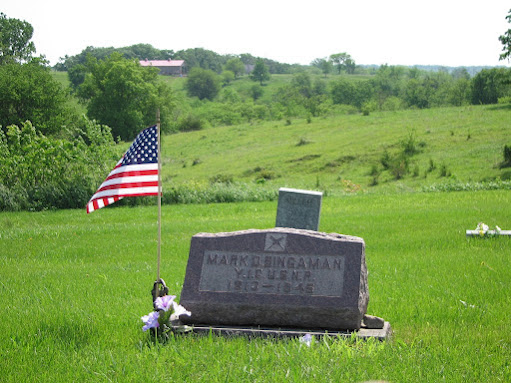Oxford Cemetery, some two and a half miles northeast of Chariton, is a lovely place in the spring --- with a view to the east that stretches for miles. Several generations of my family are buried here as are many others with surnames familiar --- and not.
Toward the southeast corner, is the cenotaph of Mark Bingaman, who died on the 19th of March 1945 when his ship, the U.S.S. Franklin, was struck by two armor-piercing Japanese bombs resulting in the loss of 836 American lives. His physical remains were buried at sea.
Among those whose remains are buried here, although in an unmarked grave, is another young man, Alonzo Thompson, who died of tuberculosis in his 25th year, on March 22, 1882.
His parents were Edward S. and Mary Thompson, who moved to Lucas County from Mount Pleasant during 1868 and built a mill, the Alcana Flouring Mill, three and a half miles northwest of Chariton in the Oxford neighborhood. During 1875, the Thompsons built a second Mill, at Lucas, and Edward was for a time quite prominent in the county --- elected to serve in the Iowa House of Representatives during 1874.
The Thompsons were Universalists, so it's unlikely that they were affiliated with the neighborhood Oxford church, which was Methodist, but when their son, Alonzo, died he most likely was buried in the neighborhood Oxford Cemetery, the nearest to the family home.
The family moved on about 1890 and Edward lived in South Dakota and California before finally settling down in old age at Windom, Minnesota, where he died during July of 1908.
Although he never got around to marking his son's grave in Lucas County, he did leave behind a memorable obituary, published in the Chariton Democrat-Leader of March 30, 1882, that serves as a memorial and as a reminder that "liberal" religion has a history in the south of Iowa, too.
+++
Died, on the 22d inst, at his parents' residence in Lincoln township, in the twenty fifth year of his age, Alonzo Thompson. His disease was rheumatic consumption, with which he has been afflicted for five or six years.
Deceased was a young man of unusually clear mind and bright intellect. Few men of his age had devoted so much time to study, and few could learn as easy as he. He never read trash, and hence he had a vast amount of useful knowledge. He had been devoting a part of his time for a year or two past to the study of medicine, and had he lived no doubt he would have been a useful man and an honor to the profession.
He was loved and respected by all who knew him, but was best appreciated by the most intelligent. In his religious views he was very liberal. He said any religion is good that teaches men to do good. He did not believe that an infinitely wise and good being would create a world and people it with intelligent beings, and then permit the great majority of them to be eternally tormented. He was honest in these views as any man that ever lived. He said to his father a few days before he died, that although he wanted to live he had no fear of death, and no man has ever met death more courageously than he and he was conscious to the last.
If there be a better world he is happy. If there is not, he is at rest.
What art thou death that I should fear
The shadow of a shade,
What's in the name that meets the ear
Of which to be afraid.
Then let us pass our lives in peace
The little time we stay,
Nor let our acts of friendship cease
Till life shall fade away.




1 comment:
I have several relatives buried at Oxford. Mark Bingaman being one, he was my great uncle. My grandmother, Elsie Marie Bingaman Burgett's brother.Thank you for sharing this story.
Post a Comment